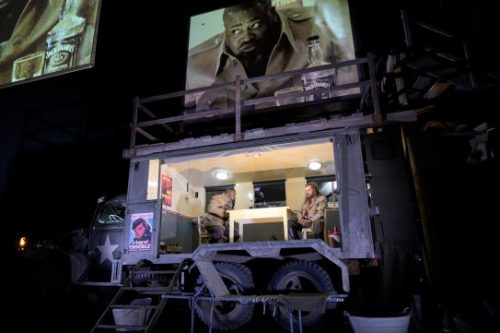 Germany Verdi, La forza del destino: Deutsche Oper Chorus and Orchestra / Jordi Bernàcer (conductor), Deutsche Oper Berlin, 24.9.2019. (JMI)
Germany Verdi, La forza del destino: Deutsche Oper Chorus and Orchestra / Jordi Bernàcer (conductor), Deutsche Oper Berlin, 24.9.2019. (JMI)

Production:
Director – Frank Castorf
Sets – Aleksandar Denic
Costumes – Adriana Braga Peretzki
Lighting – Lothar Baumgarte
Cast:
Don Alvaro – Russell Thomas
Leonora – María José Siri
Don Carlo – Markus Brück
Padre Guardiano – Marko Mimica
Preziosilla – Judit Kutasi
Fra Melitone – Misha Kiria
Marquis Calatrava – Stephen Bronk
Curra – Amber Fasquelle
Alcalde – Pedraic Rowan
Trabuco – Michael Kim
Chirurgo – Byung Gil Kim
This, the first new Deutsche Oper production of the season, premiered a few days ago and was received (rightly) with a hail of boos. There are good productions and bad ones, but this falls into a different category. Frank Castorf’s work is mainly notable for its ridicule of the opera itself and for seeking to provoke at all costs. It makes no sense for someone who apparently does not believe in the work he has to stage to go ahead with it. Nor does it make sense for theaters to accept without question the new creations of directors. Theaters are still responsible for the result.
The action has been moved to the time of the Spanish Civil War. During the famous overture, we find the Marquis de Calatrava giving a fake speech on the terrace of his house. The speech, which one reads on the upper screen, goes on the glass eyes (an important subject in this opera). Don Álvaro arrives carrying a basket, and we all wonder why. The maid, Curra, opens it during Leonora’s duo with Don Álvaro and begins to eat what appear to be oysters from the basket. Act I ends with the accidental death of the Marquis de Calatrava, but that does not prevent him from getting up as the act ends to make a real speech explaining that what Curra ate from the basket were not oysters but glass eyes!
The revolving stage takes us next to Hornachuelos, where two large screens appear above the stage with projected images that have nothing to do with the opera’s plot, which is annoying and distracting. When Leonora is set to enter the monastery, she is received at the door by Fra Melitone and a semi-naked man who seems to be from a cabaret. He apparently lives in the Monastery – he also embraces Padre Guardiano with affection. During the beautiful musical passage of the ‘Vergine degli angeli’, the screens above show this semi-naked man dancing all over the place and preventing one from concentrating on music.
In Act III, scenes of a forest are shown while Don Alvaro sings his aria. Throughout the scene between Don Carlo and Don Álvaro, the screen images show the horrors of war, with nuns in red plastic shorts who end up dancing with the patients. Curiously, when Don Carlo discovers the true identity of Don Álvaro, the latter (who is supposed to be injured) gets up and leaves; a bit later the surgeon appears to tell Don Carlo ‘È salvo’. The final scene in this act, known as the ‘rataplan’, features an extra who circles the stage with flags: it’s the only thing he does, and the reason for it escapes me.
In the last act, before returning to the monastery, there are two long speeches, one by the cabaret guy from the monastery and the other a duet by two extras on the figure of Christ. In the final scene, Don Carlo is placed on an army truck, and Leonora, the supposed hermit, appears in transparent garb, having apparently being stabbed off stage. I am not sure if her brother dies too since the screen image shows him alive and smoking. Frank Castorf’s last great stroke of genius comes in the final minutes when the screens offer visions of Broadway and Times Square by night.
I hope that my readers forgive me for this long description, but one does not have the chance to see a production like this every day, and I can’t resist sharing my ‘joy’.
When a conductor has all this in front of him, it must be almost impossible to concentrate on the musical direction. However, Jordi Bernàcer’s reading was both adequate and interesting with a good dramatic charge. It would be good to see him in other circumstances, because it is clearly difficult with this production to concentrate on the music.
The part of Don Álvaro was interpreted by tenor Russell Thomas, who was the best in the cast. I found him to be a better singer and actor than the last time I had seen him on stage as Verdi’s Otello. His voice is attractive, and he sang with gusto in a praise-worthy performance.
María José Siri as Leonora di Vargas was satisfactory although not exceptional. Her voice is adequate for the role and she sang with taste, but I missed more nuance in her delivery. Markus Brück as Don Carlo handled his voice well, though there were too many open sounds.
Padre Guardiano was sung by Marko Mimica who did fine in the role. Mezzo-soprano Judit Kutasi was again on stage after singing the role of Ulrica the night before. Her Preziosilla wasn’t very interesting, although her voice seemed more appropriate for this character than for Ulrica. Misha Kiria was a sonorous Fra Melitone, but I remember Carlos Chausson, unsurpassed in this role. The Marquis de Calatrava was Stephen Bronk, who did it properly.
José M. Irurzun
